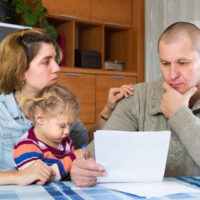Children, Divorce, and Minimizing the Negative Impact

Divorce hits everyone hard, but children are especially affected because they do not have the emotional and psychological development to truly process what is happening. To many, divorce feels like abandonment and a message that their world has no stability or security. This can be devastating, and have long-lasting effects on the child’s psyche, particularly their ability to socialize and to engage in dangerous activities. Ultimately, getting divorced may be best for the family, but parents need to be cognizant and sensitive to the long-term implications of this decision when they announce the divorce, create a parenting plan, and communicate with the child about the divorce case itself. There is no way to completely eliminate the shock and strong emotions children typically experience in the wake of divorce, but the more parents do to help the child transition to the new normal, the better the child will come out of the experience with minimal effects. There are a number of techniques parents can use to mitigate the ill effects of divorce, but to make them most effective, they should be used from the very beginning. A discussion of some of the most common ways to help a child through the changes of divorce will follow below.
How Do Children View Divorce?
Depending on the age of the child, he/she may or may not really understand what divorce means, but most will anticipate or experience fewer financial resources and less time with at least one parent. This dynamic introduces a level of insecurity that is outside the coping skills of a child, and manifests as feelings of stress, anxiety, guilt, anger, and low self-esteem. This can also cause changes in social and family behavior, leading to violent outbursts, lower grades at school, and withdrawal from family and friends.
Explaining the Situation
No parent wants to see their child suffer, and the first step in reducing the negative implications of divorce is to have a plan directing how the child will be informed about this decision. Hearing the news from both parents is the best way to approach this conversation, as it helps to reinforce the ongoing role of each parent in the child’s life regardless of the upcoming changes. In addition, the discussion should include statements that it is okay for the child to be upset about this decision and that the situation is not the child’s fault. Importantly, parents should be candid that divorce is happening and the parents will not be getting back together. This means they should be ready and open to the child asking questions about the divorce and how it will affect the family.
Conflict
The primary reason children experience negative fallout from divorce is witnessing or bearing the brunt of conflict between the parents over their relationship or the divorce process. Divorce produces a lot of strong emotions for everyone affected, but parents must make a concerted effort to control such outbursts in front of the children, and instead, work out these issues in therapy or with an attorney or mediator. Importantly, the specifics of the divorce case should not be discussed with or in the presence of a child, as it just reinforces the disintegration of the family unit.
Parenting
Finally, both parents should make a concerted effort to spend as much time with the child as possible, which will require the parents finding an ability to cooperate and put the needs of the child first. Co-parenting is typically the best way to minimize the negative outcomes of a divorce and crafting a parenting plan to facilitate this type of approach should be discussed with a divorce attorney.
Get Legal Advice
Adjusting to the changes of divorce is hard for adults who understand the situation, but children are facing a much harder battle. Speak with the Orlando divorce attorneys at Donna Hung Law Group to learn to structure your divorce to reduce the stress and anxiety on your children. Our Orlando divorce firm understands the challenges you are facing and will work to get the results you need to move forward. Contact us at (407) 999-0099 for a consultation.
Resources:
scholarsarchive.byu.edu/intuition/vol13/iss1/3/
popculture.com/country-music/2019/02/22/jason-aldean-opens-up-child-of-divorce-became-normal/
https://www.donnahunglaw.com/adultery-and-divorce-does-an-affair-matter/

